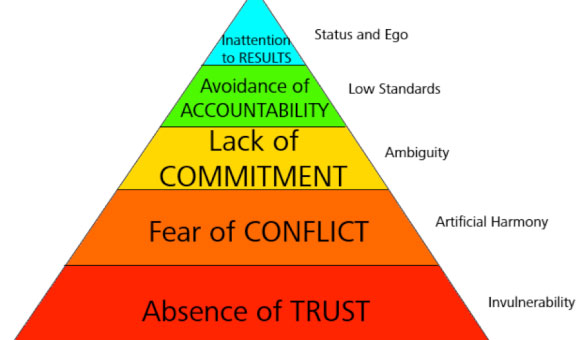
5 Dysfunctions of Teams
In his leadership fable, “The Five Dysfunctions of a Team”, author and consultant Patrick Lencioni shares with us why teams become dysfunctional. When Lencioni describes the five dysfunctions he puts them into a pyramid and teaches us we must solve the first dysfunction (trust) before we can move on to the next dysfunction – solving each subsequent dysfunction is dependent upon solving the prior one.
Lencione complements the fable with assessments, a workbook, and other assets that make this approach a very valuable framework for any team attempting to strengthen teamwork and achieve better results. There is a stepwise process of engaging the interwoven principles of the model, the realization of which results in a high performing team.
While Lencione’s roadmap points clearly to true north, the exercising of these interrelated principles is not so easy. This is where the utility of a seasoned communication skills expert and conflict management advisor is valuable.
I take teams through trust-building exercises that are practical and effective for business teams and leaders. After trust is established, the work then turns toward helping people find their right voice and ears for in-depth discussion – and even candid debate – where appropriate. Skills are learned in both expressing oneself powerfully and listening actively when there may be disagreement. The remainder of the dysfunctions – as outlined below – are then addressed in step-wise fashion as the learning unfolds.
- Absence of Trust. Successful teams trust each other. Team members are vulnerable, open-up to each other, and accept feedback when they are performing below expectations. On a dysfunctional team there is an absence of trust, people talk behind each other’s backs, cliques are common, and they don’t believe in each other’s strengths.
- Fear of Conflict. People on successful teams aren’t afraid to engage in good conflict where they debate about anything that improves results. Everyone is heard and ideas are debated. Team members aren’t personally offensive or defensive and only focus on activities that will improve results. Because dysfunctional teams don’t trust one another, they are unable to engage in good conflict that pushes the organization toward excellence.


- Absence of Trust. Successful teams trust each other. Team members are vulnerable, open-up to each other, and accept feedback when they are performing below expectations. On a dysfunctional team there is an absence of trust, people talk behind each other’s backs, cliques are common, and they don’t believe in each other’s strengths.
- Fear of Conflict. People on successful teams aren’t afraid to engage in good conflict where they debate about anything that improves results. Everyone is heard and ideas are debated. Team members aren’t personally offensive or defensive and only focus on activities that will improve results. Because dysfunctional teams don’t trust one another, they are unable to engage in good conflict that pushes the organization toward excellence.
- Lack of Commitment. Team members on successful teams are personally committed to the teams’ goals. If team members don’t really trust each other and don’t engage in healthy conflict and debate about team goals and strategies, they will most likely not be committed to common team goals. Individual objectives begin to trump team goals or objectives. Lencioni makes this important point – even if team members disagree about the goal, when they feel like they have been heard and their ideas discussed, they will be more willing to commit to the team goals even if they disagree with them.
- Avoidance of Accountability. On successful teams, people hold themselves and peers personally responsible for actions and results. When team members are not committed to team goals and standards and they don’t engage in healthy conflict, they won’t hold each other accountable. The leader or manager becomes the “enforcer” of accountability and that only works for a limited time.
- Inattention to Team Results. I think we all know that people on successful teams really pay attention to the overall team results. When team members stop paying attention to and working hard toward achieving team results, this becomes the ultimate dysfunction. Poor results will follow. A symptom of this is when you see team members totally focused on only personal objectives without regard to the team objectives. It is a good thing for individuals to focus on their objectives as long as those objectives support the team’s objectives and are not in conflict with them.

OFFERINGS
I offer half day, full day, and two day trainings on this model. Beyond the training, I lead consulting engagements on this model for teams who are attempting to learn into this approach to leadership and teamwork.
Recommended is a six-month engagement when I’m able to participate in team meetings where I consult with and train the model amidst team discussions. I also offer concurrent coaching services if desired.




 Get In Touch
Get In Touch 

